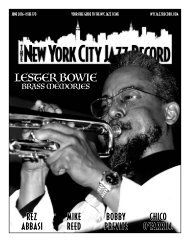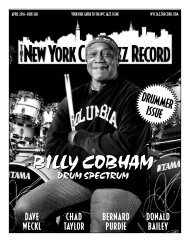Create successful ePaper yourself
Turn your PDF publications into a flip-book with our unique Google optimized e-Paper software.
C D REVIEWS<br />
Live at the Village Vanguard<br />
Christian McBride Trio (Mack Avenue)<br />
by Ken Dryden<br />
Christian McBride’s big sound and effortless swing<br />
caught the attention of many bandleaders early on. By<br />
the mid ‘90s, the bassist’s career as a leader was<br />
underway and there were comparisons to the master<br />
bassist Ray Brown, with whom he played and recorded.<br />
But McBride has long since forged his own voice and<br />
has regularly produced acclaimed and often surprising<br />
CDs. These live trio sessions, recorded over several<br />
days at the Village Vanguard, feature his long time<br />
drummer Ulysses Owens, Jr. and up-and-coming<br />
pianist Christian Sands.<br />
McBride’s band can’t help but be compared to<br />
Benny Green’s trio, of which he was a member for<br />
several years in the early ‘90s. Of course, McBride’s<br />
then-formidable technique has grown tremendously<br />
since and he’s calling the songs, a diverse program of<br />
music he’s heard or performed dating back to his teens,<br />
including neglected jazz works, familiar chestnuts and<br />
some surprises. Among the less-frequently-performed<br />
songs are Wes Montgomery’s infectious blues “Fried<br />
Pies” and J.J. Johnson’s driving bop number “Interlude”,<br />
both great features for the talented Sands and gems that<br />
need further exploration. The leader generously<br />
includes a Sands original, the enticing ballad “Sand<br />
Dune”, demonstrating that the young man’s lyricism<br />
measures up to his chops at blazing tempos.<br />
The warhorse “Cherokee” has long been a favorite<br />
for rapid-fire performances and a chance to show off;<br />
the trio takes a slightly different approach, switching<br />
back and forth from the faster tempo, with McBride<br />
stealing the solo spotlight. “Good Morning, Heartache”,<br />
made famous by Billie Holiday, is a showcase for the<br />
leader’s warm arco technique. The spiritual favorite<br />
“Down By the Riverside” is a joy in a breezy<br />
arrangement with a touch of funk and inspired<br />
moments by the trio. McBride sends the crowd off<br />
laughing with a rollicking, playful interpretation of the<br />
‘70s pop tune “Car Wash”, putting the spotlight on<br />
Owens. No matter what size ensemble he is leading,<br />
Christian McBride is a master at grabbing an audience’s<br />
attention and retaining it throughout a concert.<br />
For more information, visit mackavenue.com. This project is<br />
at Village Vanguard Dec. 1st-6th. See Calendar.<br />
Book II<br />
Yoni Kretzmer 2Bass Quartet (OutNow)<br />
by Brad Cohan<br />
A small but crucial scene of pioneering, Israeli-born<br />
jazz musicians spreading their creative fire is afoot in<br />
New York. Add tenor saxophonist Yoni Kretzmer to<br />
that freethinking canon. A Brooklyn transplant,<br />
Kretzmer has been documenting his own musical<br />
happenings, as well as those of his peers, through his<br />
OutNow Recordings and by the off-and-on concert<br />
series of the same name.<br />
The imprint has seen a flurry of releases, including<br />
a set by reedplayer Josh Sinton and double bassist<br />
Dominic Lash and a couple of offerings by Kretzmer<br />
himself: one a duo record with drummer Andrew<br />
Drury, the other the sophomore effort by his 2Bass<br />
Quartet. The band—as its moniker conveys—is a<br />
singular behemoth supported by the dueling double<br />
bass assault team of Reuben Radding and Sean Conly<br />
and the bold drummer Mike Pride. The two-CD sprawl<br />
of Book II is a free-minded yet disciplined tour de force<br />
of melodicism fused with experimentation, where no<br />
player assumes the role of genuine leader. Instead, each<br />
musician ostensibly takes turns handing off the baton<br />
as they impart their own unique sonic language to nine<br />
spacious explorations. Throughout this sonic journey,<br />
there’s nary a moment for a breath to be exhaled, the<br />
quartet relentless in pursuit of exhilarating sounds yet<br />
the aesthetic is not of the firebreathing variety.<br />
That vibe is established with opener “Haden”, a<br />
mini-tribute to the late, great bassist. At a compact<br />
three-and-a-half minutes, it’s more than enough time<br />
for the four to converge and converse, each equipped<br />
with salvos of ideas and running wild with them,<br />
giving the listener the gamut of what’s to come. Some<br />
compositions mirror their titles. “Soft” is akin to a<br />
freight train steadily rumbling down the tracks but<br />
with a one-two bass punch as its engine while “Ballad”<br />
is just that, a sublime slow burner complete with<br />
Kretzmer shining with melodic phraseology.<br />
While it’s easy to say the lethal Radding/Conly<br />
combo is this album’s heartbeat, with its bow on strings<br />
buzzsawing and beefy rhythmic plucking, this is clearly<br />
a group effort and collective vision. Book II’s epic<br />
middle section is evidence: nearly-ten-minute “Stick<br />
Tune” is primal energy music as Kretzmer takes the<br />
spotlight, his hurricane-force blows dancing, swinging<br />
and screaming; “Metals” features classical musicflavored<br />
abrasive stroking and caressing of the basses;<br />
and Pride puts his heavy stamp on “Freezaj” with a<br />
devastating drum clinic. Meanwhile, the 19-minute<br />
long “Number Four” fittingly stands alone on the<br />
second disc, its rollercoaster of a freebop ride a furiously<br />
bobbing and weaving beast.<br />
For more information, visit outnowrecordings.com. Kretzmer<br />
is at Muchmore’s Dec. 1st. See Calendar.<br />
RelativE ResonancE<br />
Devin Gray (Skirl)<br />
by Stuart Broomer<br />
As a drummer, Devin Gray has performed with a<br />
spectrum that includes some of the most creative<br />
figures in jazz, including duos with Ellery Eskelin and<br />
Gerald Cleaver, the trio Transit Heavy with Satoko Fujii<br />
and Natsuki Tamura, a trio with Uri Caine and Michael<br />
Formanek and bands led by Nate Wooley and Mark<br />
Helias. He launched his career as a composer in 2012<br />
with the quartet Diego Rataplan and he continues here<br />
with another, RelativE ResonancE, with tenor<br />
saxophonist/clarinetist Chris Speed, pianist Kris Davis<br />
and bassist Chris Tordini.<br />
It’s clear very quickly that there’s nothing casual<br />
about Gray’s compositional impulses or the group that<br />
he’s assembled to play them. The opening “City<br />
Nothing City” presents a leaping line that suggests a<br />
kind of post-serial bop, an effective introduction to this<br />
very tight-knit, rhythmically adroit music. There’s an<br />
initial sense of abstract, interlocking parts densely<br />
woven around a central theme, but, as the pieces<br />
proceed, a more complex methodology emerges. Most<br />
of the pieces have been composed as a group of distinct<br />
etudes, each assigned to a member of the quartet. The<br />
development consists in the musicians adjusting their<br />
individual scores to one another’s to create a coherent<br />
piece of music.<br />
“Notester”, the first of these, has Speed at times<br />
playing an arpeggiated line to which Davis and Tordini<br />
adjust ostinato figures. The method is an intriguing<br />
philosophical response to notions of group<br />
communication and vocabulary as they arise in a<br />
musical situation, the written component isolating<br />
individuals, the situation requiring close interaction.<br />
What’s remarkable is the kind of freedom and dialogue<br />
the group achieves on some of the pieces, developing<br />
an original kind of swing on pieces like “Transatlantic<br />
Transitions” and “Undo the Redo”. Gray has<br />
successfully combined the timbres and techniques of<br />
contemporary jazz with indeterminacy techniques<br />
associated with composer Morton Feldman.<br />
The individual musicians’ lightness of line<br />
contributes tremendously to the process. Speed’s<br />
particularly dry sound on both clarinet and tenor<br />
saxophone (at times he actually sounds like a bassoon)<br />
gives the group an original sound while Davis, Tordini<br />
and Gray seem to defy the usual gravity of a rhythm<br />
section. Davis is particularly adroit in blurring the line<br />
between the composed and the improvised, seemingly<br />
reading spontaneously and improvising with rare<br />
precision. In a period rich in methodological inquiry,<br />
Gray is developing his own way.<br />
For more information, visit skirlrecords.com. This project is<br />
at Korzo Dec. 1st. See Calendar.<br />
R<br />
eco<br />
m<br />
m<br />
ended<br />
n<br />
e<br />
w<br />
r<br />
ele<br />
a<br />
ses<br />
• Aram Bajakian—Music Inspired by The Color<br />
of Pomegranates (s/r)<br />
• Dave Ballou—Solo Trumpet (Clean Feed)<br />
• Bambi Pang Pang (featuring Andrew<br />
Cyrille)—Drop Your Plans (El Negocito)<br />
• Kenny Barron—At the Piano<br />
(Xanadu-Elemental Music)<br />
• Scott Dubois—Winter Light (ACT Music)<br />
• George Garzone/Jerry Bergonzi/<br />
Ra-Kalam Bob Moses/Richard Andersson—<br />
Splitting Up In Boston (Hobby Horse)<br />
• Sheila Jordan—Better Than Anything: Live<br />
(There Records)<br />
• Ingrid Laubrock—Ubatuba (Firehouse 12)<br />
• Larry Ochs—The Fictive Five (Tzadik)<br />
• Steve Swell—The Loneliness of the Long<br />
Distance Improviser (s/r)<br />
Laurence Donohue-Greene, Managing Editor<br />
• Joseph Daley/Warren Smith/<br />
Scott Robinson—The Tuba Trio Chronicles<br />
(JoDa Locust Street Music)<br />
• Tim Daisy—October Music Vol. 1:<br />
7 Compositions for Duet (Relay)<br />
• Scott Dubois—Winter Light (ACT Music)<br />
• Logan Hone—Similar Fashion<br />
(pfMENTUM)<br />
• Le Rex—Wild Man (Cuneiform)<br />
• Livio Minafra/Louis Moholo-Moholo—<br />
Born Free (Egea)<br />
• The Necks—Vertigo (Northern-Spy)<br />
• Evan Parker/Keith Rowe/Barry Guy/<br />
Eddie Prévost—Supersession (Matchless)<br />
• Premature Burial—The Conjuring<br />
(New Atlantis)<br />
• Matthew Shipp Trio—The Conduct of Jazz<br />
(Thirsty Ear)<br />
Andrey Henkin, Editorial Director<br />
16 DECEMBER 2015 | THE NEW YORK CITY JAZZ RECORD




